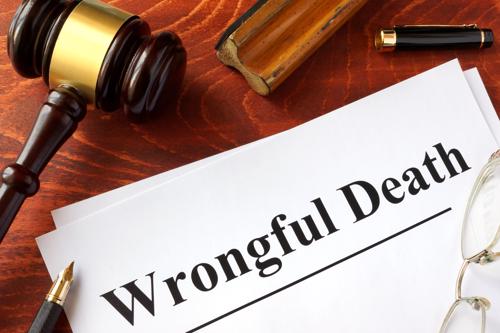Nothing is as devastating and traumatizing as losing a loved one unexpectedly. One minute you were enjoying life together, and before you know it, they are gone. This is especially difficult if the negligent actions of another party caused it.
If you have lost a loved one due to another person’s or entity’s negligence contact the wrongful death lawyer Reginald Greene. He will work tirelessly to ensure that the parties responsible are held accountable.
We understand that no amount of money can replace your loved one, but we will ensure that we fight for justice for your family. We have experience of over 20 years in the legal field; hence you need not worry as you are in the right hands.
We have recovered millions of dollars in settlements for our clients; hence you should not hesitate to call our personal injury lawyers at 866-4-LAW-411.
How Is Wrongful Death Defined?
Wrongful death is defined as a legal claim brought against an individual or entity whose negligent, reckless, or intentional actions caused the death of another person.
This type of lawsuit is a civil action, typically filed by the surviving family members or the estate of the deceased, seeking compensation for the financial and emotional losses resulting from the death.
The basis of a wrongful death claim is proving that the defendant’s actions directly led to the fatal incident, whether it was due to a car accident, medical malpractice, defective product, or another form of negligence or misconduct.
In a wrongful death claim, the damages sought can include compensation for the deceased’s medical expenses before death, funeral and burial costs, loss of future earnings, loss of companionship, and the emotional pain and suffering endured by the surviving family members.
Each state has its own laws and procedures governing wrongful death claims, including who is eligible to file the lawsuit and the time frame within which it must be filed. These laws are designed to provide justice and financial support to those left behind after a tragic loss.t.
Common code sections for wrongful death claims vary depending on the jurisdiction, as each state in the U.S. has its own statutes governing these claims. Here are some of the commonly referenced code sections in various states:
- California: California Code of Civil Procedure § 377.60 – This section outlines who may bring a wrongful death action in California and the types of damages that may be sought.
- New York: New York Estates, Powers & Trusts Law (EPTL) § 5-4.1 – This statute governs wrongful death claims in New York, specifying the time frame and eligibility for filing a claim.
- Texas: Texas Civil Practice and Remedies Code § 71.002 – This section defines wrongful death in Texas and describes the circumstances under which a wrongful death claim may be brought.
- Florida: Florida Statutes § 768.16-768.26 (Florida Wrongful Death Act) – These sections provide the framework for wrongful death claims in Florida, including who may file a claim and the types of damages recoverable.
- Illinois: Illinois Compiled Statutes (740 ILCS 180/) – The Illinois Wrongful Death Act governs wrongful death claims in the state, detailing who may sue and what damages may be recovered.
- Georgia: Georgia Code § 51-4-1 to § 51-4-5 – These sections define wrongful death in Georgia and set forth the rules for filing a claim, including the types of damages that may be awarded.
Each state’s wrongful death statute will specify the eligibility to file, the time frame (statute of limitations), and the types of damages that may be sought. It’s important to consult the specific code sections relevant to the jurisdiction where the wrongful death occurred to understand the applicable laws.
Who Is Qualified To File A Wrongful Death Claim?
The entitlement to file a wrongful death claim is generally limited to specific individuals who had a close relationship with the deceased. Typically, immediate family members such as the surviving spouse, children, and parents are first in line to file a claim.
In some states, if there are no immediate family members, other relatives such as siblings or grandparents may have the right to file. Additionally, the personal representative of the deceased’s estate may bring a wrongful death claim on behalf of the estate and the beneficiaries.
The eligibility to file can vary by state, with some jurisdictions allowing domestic partners, financial dependents, or putative spouses to file a claim. The purpose of these laws is to ensure that those who were financially and emotionally dependent on the deceased can seek compensation for their loss.
What Types Of Damages Are Recoverable?
When it comes to wrongful death claims, there are two distinct types of cases. The first one is a claim to establish the full value of the life of the deceased. This claim is usually brought by the surviving family members of the deceased.
It includes monetary damages related to the tangible and intangible value of the person who has passed on. They include:
Loss of companionship and other intangible benefits that the deceased person would have provided for their family if they were still alive.
The intangible component consists of the things in life that people value most such as time with loved ones, playing sports, having quality time with the children, having fun, and going through milestones such as attending the graduation of the children and birthdays.
It is hard to replace someone’s value, but the court tries as much as it can to ensure that the surviving family gets justice.
Lost wages and benefits. This is the tangible value of a person’s life. An example of this is the amount that a person would have earned throughout their life if they would have lived. Since they are no longer alive and working, the family will be compensated.
The second type of claim is meant to take care of the financial losses that the surviving family has suffered due to the person’s death. It is usually also brought forth by the family or the representative of the estate.
Damages that are recovered in this claim typically include:
- Burial and funeral expenses.
- Medical expenses that are related to illness or injury of the deceased.
- Pain and suffering endured by the deceased before their death.
If a spouse files a wrongful death claim for the deceased who did not have a will or beneficiaries to their estate, then state laws will require the spouse to share the award with the children left behind.
The surviving spouse will get a third of the proceeds, and the children will have the remainder divided among them. However, if the children are under 18 years of age, then the guardian will have custody of the minor’s portions until they are of legal age.

Can The Surviving Family File For Punitive Damages?
Surviving family members may be able to file for punitive damages in a wrongful death claim, but this depends on the specific circumstances of the case and the laws of the state where the claim is filed.
Punitive damages are intended to punish the defendant for particularly egregious or malicious conduct and to deter similar behavior in the future. These damages are not awarded in every wrongful death case; they are typically reserved for situations where the defendant’s actions were willfully reckless, grossly negligent, or intentional.
For instance, punitive damages might be considered in cases involving drunk driving, gross medical negligence, or deliberate acts of harm.
The availability of punitive damages varies by state, with some states allowing them in wrongful death cases and others either restricting or prohibiting them altogether. Where allowed, the surviving family members or the estate must prove that the defendant’s conduct was so severe that it warrants additional punishment beyond compensatory damages.
This can be a challenging legal standard to meet, requiring substantial evidence and legal expertise. If successful, punitive damages can significantly increase the financial recovery for the family, sending a strong message that such behavior will not be tolerated.
How Is Negligence Proved In A Wrongful Death Case?
Negligence is the failure to exercise the care towards others in a way a reasonable person would. In wrongful death cases, it is crucial to show that the defendant acted negligently to ensure that your claim is valid. Otherwise, you will have no case.
Four main elements are required to prove negligence. They include:
Duty Of Care
Here, the claimant needs to show the court that the defendant owed the decedent a duty of care in the situation that led to death. A duty of care is a legal term that means that the defendant had the responsibility to act responsibly and reasonably.
For example, drivers should not drive while intoxicated or speeding, and they should obey the traffic laws. Another example is that the nursing homes should not abuse their patients, but instead treat them well and ensure that their needs are met.
In the situation where the deceased died due to overspeeding, the claimant could argue that the defendant was acting negligently and that they owed a duty of care to the decedent to operate the automobile efficiently.
In a wrongful death case, the judge, and not the jury, is responsible for deciding whether the defendant owed a duty of care. They will consider the various factors presented, such as how predictable the harm was, how closely connected the defendant’s action and the harm was, and if they are to be blamed for it.
Breach Of Duty
This refers to the failure to meet the legal and moral obligations owed to another person, as their right. According to the laws, the defendant must meet some standards and not violate their legal duty. Here, the plaintiff needs to prove that the defendant breached or violated the duty of care.
This can be done through actions or inactions that they did, which a reasonable person would have avoided. For example, in an accident, the claimant may present evidence that the plaintiff was not paying attention to the road, as it would not be something that a reasonable person would do.
Damages
Here, the plaintiff will have to prove that the plaintiff’s breach of duty led to the person’s death in question. The plaintiff must have suffered some real damages due to the negligence of the defendant. Examples of these damages include medical bills, lost wages, property damage costs, and even death.
The plaintiff must prove that the deceased suffered some damages before their death. If you do not have substantial evidence to back your claim, you may not have a strong case. This is because you will not have witness statements, videos, and pictures as evidence of what had happened.
Therefore, it may make things difficult for you. You will also need an experienced wrongful death attorney to be able to argue these facts in court, and
prove negligence.
Causation
Here, the defendant must prove that there is a direct connection between the defendant’s negligence and the accident. The acts of negligence should be proximate or be the actual cause of the plaintiff’s injuries.
This means that the accident could not have happened, had it not been due to the defendant’s negligent actions. Here is where you will need to preserve all the evidence gathered at the accident scene, as the facts will come in handy.
For example, in a car accident, the claimant will have to prove that the defendant’s vehicle caused the accident and harmed the decedent and not any other vehicle. This is because, if that were not the case, the jury would not find the defendant in breach of duty or that their actions contributed any harm to the deceased.
Proving negligence in wrongful death claims is no mean feat, and here is why you need a good lawyer. These cases are complex and require someone who is well conversant with all the state laws and knows all that is needed.
How Do You Start A Wrongful Death Claim?
Starting a wrongful death claim involves several key steps, beginning with consulting an experienced wrongful death attorney who can guide you through the legal process.
The attorney will first evaluate the merits of your case by reviewing the circumstances surrounding the death, gathering evidence, and identifying the responsible parties.
Once it’s determined that a valid claim exists, the attorney will file a wrongful death lawsuit in the appropriate court, naming the defendant(s) and detailing the legal basis for the claim.
This initial filing, known as the complaint, outlines the facts of the case, the relationship of the plaintiff to the deceased, and the damages being sought.
Throughout this process, it’s crucial to adhere to the statute of limitations for wrongful death claims in your state, as failing to file within the specified time frame could result in the loss of your right to seek compensation.
You will need to hire an attorney to help you with your case. They will advise you and tell you if your wrongful death claim will hold up in court or not. They will then investigate your loved one’s death to establish what happened. This will help them prove the negligence of the defendant in court.
Remember that if you are not allowed to file a wrongful claim your state, then your case will not be heard by the court. Therefore, ensure that you adhere to these laws to ensure that the due process is followed.
What Is The Difference Between A Wrongful Death Claim And An Estate Claim?
In a wrongful death claim, the surviving family members step into the decedent’s shoes and demand recovery for the full value of his or her life. This means that in the jury will be tasked with figuring out what the person’s life meant from the perspective of the one who has passed on.
The people with a right to file will begin from the spouse, the decedent’s parents, if the spouse is also not alive and the personal representative, if both parties are also dead. Here, monetary damages such as lost wages, loss of consortium, and work-related benefits are compensated. Moreover, intangible benefits such as love, care, and companionship will be paid.
In an estate claim, the decedent’s family is allowed to seek compensation for the pain and suffering of the deceased, any medical bills that were there before their death, funeral expense, and any other bills.
Also, if there are any punitive damages, then the estate will bring it forth to court. If the decedent had a will before passing, the administrator named in the will must bring the estate claim to court. In cases where they did not have a will, then the state laws of intestacy will apply, and determine who should bring the claim.
Schedule a Free Consultation With a Wrongful Death Lawyer
After the traumatic death of a loved one, it is natural to be in a state of shock and confused about what to do next. You will need time to accept what has happened, and since you will not be in the right state of mind, it is crucial to hire a reputable attorney to represent you.
This is because they are well skilled in these types of cases, and will take the burden off you, for you to focus on grieving your loved one. This is where the team at The Super Lawyer – Greene Legal Group comes in.
With our expertise in protecting the rights of injury victims and their families, you will be in the right hands. We will fight for your case, as we understand the pain you are going through, and ensure that you get the justice that your family deserves.
If your loved one has recently passed on as a result of another person’s negligence, do not hesitate to call us. Contact our personal injury firm today on 866-4-LAW-411. So, what else are you waiting for?






